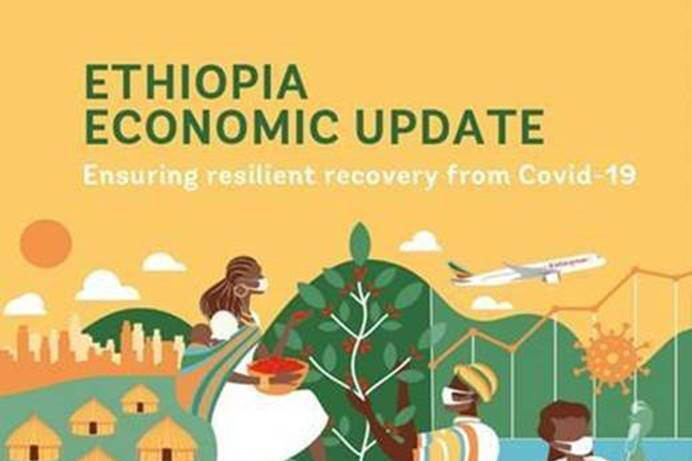Ensuring Ethiopia's Full Recovery from COVID-19 - Key Messages
In its 8th Ethiopia Economic Update (EEU), which can be downloaded here, the World Bank Group highlights the macroeconomic and microeconomic impacts of COVID-19 so far and discusses already adopted and newly proposed policy response measures.

While external demand remains depressed due to COVID-19, it is showing some signs of recovery.
- Merchandise exports excluding gold declined by 4.1 percent during July-December 2020 (year-on-year), but most items (except garments) showed signs of recovery in the second quarter of the fiscal year.
- Remittances, which dropped by 10 percent in FY20, rebounded during the first half of FY21 (19.1 percent).
- Meanwhile, net foreign direct investment remains sluggish, dropping by 1.7 percent during the same period.
Phone survey data suggests negative impacts on firm revenue and household income are protracted, which is likely to affect domestic demand
- While most companies that had to temporarily close their business have reopened since April, the reported median monthly sales revenue in October remained at just a third of the pre-COVID-19 level.
- At the household level, the proportion of respondents reporting that incomes were either reduced or had completely disappeared due to the pandemic declined from about 55 percent in April to 26 percent in October but remains a concern.
- A 5 percent decrease in payment collection by commercial banks suggest some firms and households are struggling to repay their loans.
Persistently high inflation adds to the affordability challenges faced by households
- While easing slightly during the first half of FY21, at 19.2 percent in January 2021 inflation remains high, driven by high food prices (cereals and vegetables in particular).
- Recent surveys suggest the food security situation is not significantly worse than prior to the pandemic, at least in terms of food availability, although depressed incomes due to the crisis are likely to exacerbate the food affordability challenges the poorer households are facing.
- Reserve money surged by 37 percent during July-December 2020 (year-on-year). Accommodative monetary policy was needed to prevent liquidity shortages and support the fiscal response to COVID-19, but it may add to inflationary pressures.
Outlook
- Growth is expected to decelerate further in FY21, to about 2 percent, impacted by reduced income reported by firms and households and a likely slowdown in crop production.
- With formal firms not hiring, a reduction in aggregate demand would also affect the self-employed. Casual laborers and self-employed (44 percent of urban households) are hit particularly hard with an expected downturn of the economy.
- As key macroeconomic and structural reforms are implemented and the pandemic abates, foreign direct investment, exports, and economic growth are expected to strengthen in the medium term.
Policies
- Containment. To minimize human and economic damage and prevent second wave of infections it will be crucial both to maintain containment and surveillance measures and to ensure a swift deployment of the vaccine by addressing as soon as possible gaps identified in the Readiness Assessment.
- Mitigation. There is a need to continue updating safety net benefits to address the loss in purchasing power caused by inflation and to expand coverage and facilitate registration for new beneficiaries. It will be also important to continue strengthening the successful measures adopted so far to prevent food supply disruptions.
- Firm support. Measures aimed at protecting firms may need to be rethought to optimize resources while supporting those most affected. Direct support to firms in Ethiopia has been mainly instrumented mainly through temporary tax deferrals and measures to support exporters. Overall, adopted measures are likely to have benefited formal firms almost exclusively. Going forward, support shall focus on the provision of credit to Small and Medium Enterprises (SMEs). The measures announced by the Jobs Creation Commission in December 2020 are a good step in that direction.
- Adapting to the new normal and building back better. To take full advantage of the ambitious telecom sector reforms in a world in which virtual interaction is increasingly a need, it will be important to implement the new Proclamation on e-Transactions and to strengthen the regulatory framework to facilitate digital financial services. Second, to make the most of the reconfiguration of global value chains, Ethiopian authorities shall revisit existing investment incentives, phasing out tax holidays and emphasizing machinery acquisition and worker training, while preparing as well towards WTO accession.
Source: World Bank Group